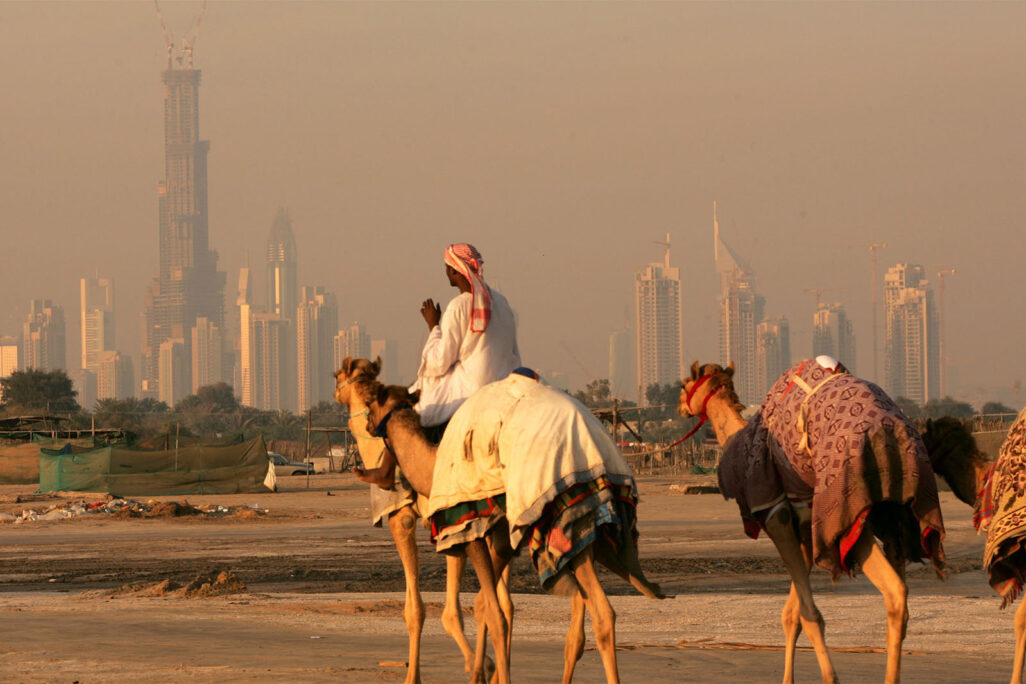
"The coronavirus is child's play compared to the climate crisis," said Professor Dan Rabinowitz, 66, who for the past decade has been researching the social, cultural and political impacts of the climate crisis. Immediately after his service in the Israel Defense Forces in the 1970s, Rabinowitz served as an instructor at a field school of the Society for the Protection of Nature near Saint Catherine’s Monastery on the Sinai Peninsula. Since then, he says, he has become "an environmentalist."
However, only in the last decade did environmental issues become the focus of his research. "Back at the field school I was mainly an anthropologist. It was my first encounter with the Bedouin Arab population, and to this day I maintain close relations with people from there. For twenty-five years I researched Arab society in Israel."
Rabinowitz's latest book, which he wrote while a professor in the Department of Sociology and Anthropology at Tel Aviv University, is called "The Power of the Deserts – Climate Change, the Middle East and the Promise of the Post-Petroleum Age." The book was published about three weeks ago by the prestigious Stanford University Press, coincidentally at the same time as the signing of peace agreements with the United Arab Emirates and Bahrain, two of the book's main subjects.
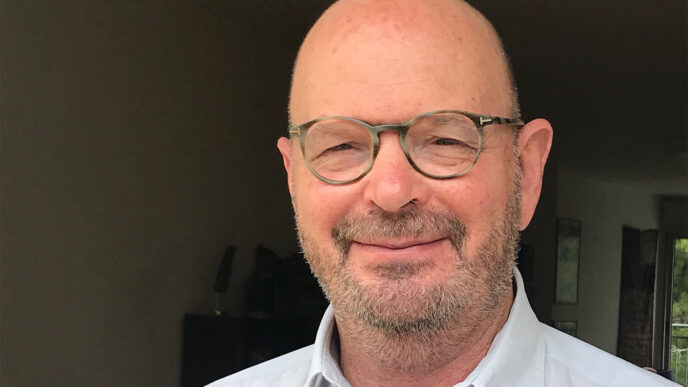
The social perspective offered by Rabinowitz on the climate crisis is gloomy and eye-opening. The solution he offers to what he defines as an "existential crisis" for many parts of the world will surprise many.
“The climate crisis does not have an expiration date”
We can’t start an interview these days without asking how COVID-19 affects your work.
"A lot of people make the link between COVID-19 and the climate crisis. We're talking about something that has no borders, that hurts the whole world, and that requires international cooperation to tackle. But when the climate crisis hits us, in a way that it's already starting to hit some places, its scope will be much larger than that of the COVID-19 crisis. And the climate crisis does not have an expiration date, or a vaccine waiting on the horizon.
The rich will always move to live where they are comfortable, and will be able to buy food even if prices increase by fifty percent. They will be able to fend for themselves because they are on the winning side of the market economy"
"Something that does draw a parallel between COVID-19 and the climate crisis is the impact that socio-economic disparities have. You are at greater risk for COVID-19 morbidity if you are poor and live in a densely populated area, if you have no choice but to go to work where you rub shoulders with others because otherwise you won’t be able to buy food. Those who can continue to work from home and receive wages or who can live on investment income are less vulnerable.
"This is also true of the climate crisis, which causes different types of damage to different populations. The rich will always move to live where they are comfortable, and will be able to buy food even if prices increase by fifty percent. They will be able to fend for themselves because they are on the winning side of the market economy."
Do you have examples of this?
"In my new book, I deal with the oil states in the Persian Gulf. They are in a location that projects to be one of the most difficult climates in the world. On the Western side of the Persian Gulf, temperatures are already reaching 42 or 44 degrees Celsius almost every day during the summer. A rise of six or seven degrees is expected there in the next few decades. This means that on a daily basis the temperatures will be above 50 degrees Celsius, with even higher peaks.
"The United Arab Emirates has 10 million people. A million of them are wealthy Emiratis and the rest are foreign workers from Asia who have a low standard of living and have no civil rights. When the temperatures of the post-normal climate era arrive, it is clear who will suffer first, who will be left with no choice, and who will be able to emigrate with the money they have accumulated and get by in Europe."
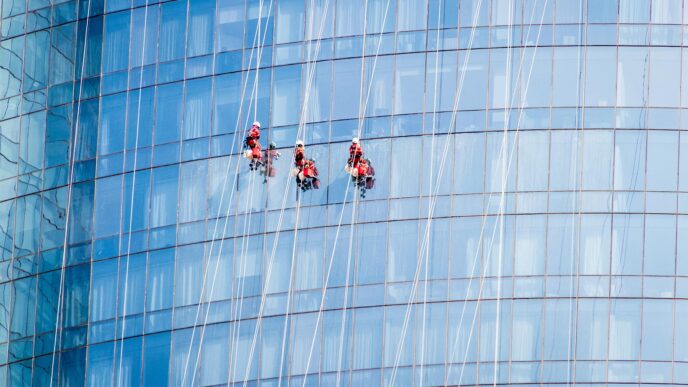
It sounds like you’re describing a definitive outcome. Are there other possibilities?
"In a sense, COVID-19 represents an experimental exercise for dealing with the climate crisis. It demonstrates what humanity can do and how, when exposed to a global disaster of a magnitude that can paralyze society for long periods.
"In a lot of ways, the global response is quite demoralizing, but there are also positive sides to the way the world has mobilized to fight the pandemic. An example is the decision to close the economy for two months to protect people at risk. Even in the United States. It seems obvious, but it is actually a pleasant surprise.
"It's a trade-off that could have been done differently. So the system's instinctive response was basic human solidarity. A very large concession was made to protect a relatively small group, even when the at-risk populations tended to be from weaker communities, although that wasn’t yet known in the early stages.
"In Israel, too, beyond closing the economy, the high infection rate in the ultra-Orthodox and Arab communities could have led to demonization, and this hasn’t happened in the mainstream discourse. What has happened is that trust in the government among these populations, which was already low, has been further eroded.
"I could easily imagine the opposite. A conscious, albeit unspoken, decision could have been made to sacrifice elderly blacks and Hispanics in the United States, so as not to hurt the economy. So what is interesting here is that humanity’s initial response was normal and healthy. Climate change is occurring less quickly, but it has already started and is already hurting a lot of people."
“We’re in a race against time”
You argue in your studies that the answer to the crisis is already in progress. That the transition to renewable energies is happening.
"Correct. We are in the midst of the crisis. We know what will get us out of it, we are moving there, but not fast enough.
"Today, almost 70 percent of new or planned power stations are alternative energy stations. Mostly solar power. In the next 30 years, we will go from where two percent of the world's electricity is solar, to 25 percent. So the revolution has begun. But conventional power stations, which operate on coal and gas will continue to be active for several more decades.
"Another matter is the move to electric vehicles. Transportation is 50 percent of the demand for oil and oil products as of today. It is about to disappear. By 2025, all automakers will have electric models, and by 2030, it will no longer be possible to purchase a new car with a standard internal combustion engine. Here too, we see the change happening.
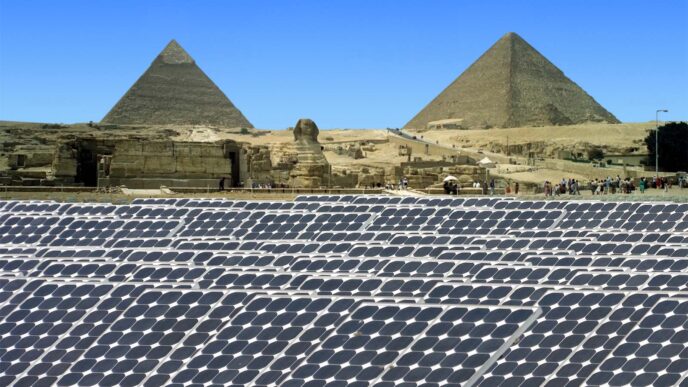
"So I say that this train of replacing fossil fuels with renewable energy has already left the station, but it's not that simple. You can think of it as a train that is climbing slowly up a forested mountain, and finds that it’s being chased by a fire.
"The driver and the passengers know that they only have to reach the top of the mountain and then glide down to safety. But they’re not travelling fast enough. This is the race against time that we are in.
"And if we continue with the metaphor of the forested slope, then the pace at which the train needs to climb is determined by the carbon subsidy regime. This is the thing that makes it difficult for the train to move forward. The regime of subsidies granted by governments to polluting industries is very sophisticated and varies from country to country."
So you’re saying that the reason we are in a climate crisis is that we are subsidizing those who are causing it?
"The automobile industry in the United States was rescued from the 2008 financial crisis by tens of billions in government subsidies. In actuality, this is financing for the oil industry that these vehicles consume.
"The fact that countries around the world are paving and maintaining roads, and not imposing differential taxation on their use, is also financing for the oil industry. Covert, but significant. Certainly as long as people drive on these roads, mainly carbon-producing vehicles, running on oil.
We are in the midst of a crisis. We know what will get us out of it, we are moving there, but not fast enough."
"To this list can be added very low taxation on fuel in parts of the world, the United States for example, and underinvestment in public transportation. Oil companies do not have to receive direct funding from the state. It is enough for them to not invest in public transportation or impose taxes on fuel.
"This is without going into issues such as the low royalties paid by the gas-extraction companies in Israel, or tax breaks for car manufacturers and electricity companies."
So it’s just a matter of money?
"No. Europe has subsidized renewable energy for years. But since 2019, most companies in the field no longer receive subsidies, because they are simply not needed. Solar power generation or wind turbines now give a return on investment within a reasonable timeframe. In the last decade, electricity costs from solar panels have fallen by more than 90 percent, from $360 per megawatt-hour to $20 per megawatt-hour.
"This is the situation. It makes more sense today to generate alternative electricity. It makes more sense to drive electric vehicles that get the electricity from a grid that is becoming more and more solar. And yet we are still seeing a rise in greenhouse gas emissions."
What makes the subsidy regime so stable is the fact that during the boom years of oil, the big money in this industry was used to buy the government. The relationship between the fossil fuel industry and governments is very potent"
"Despite these changes, the train is traveling too slowly, and that's because of the subsidy regime. What makes the subsidy regime so stable is the fact that during the boom years of oil, the big money in this industry was used to buy governments. The relationship between the fossil fuel industry and governments is very potent.
"There are almost no politicians in the Western democratic world who could make the move to eliminate fossil fuels and stay in power. And in oil-producing countries the situation is worse because oil is the government. This is the situation in Russia, the Gulf states, parts of West Africa, South America and more."
“Ride the tiger, instead of being its prey”
It sounds like we should be in despair. Scientifically there are solutions, but politically they are not feasible.
"No. Here is where I make the main argument of my book. In the race against time we are in, there is a group of countries that are uniquely situated. Countries that are poised to be the catalyst for the energy revolution. These are the six 'oil-rich kingdoms', Saudi Arabia (the largest), UAE, Kuwait, Bahrain, Qatar and Oman.
"What is unique about these six is, first of all, that they are jointly responsible for 30 percent of the world's oil production, and for 30 percent of the oil reserves. They have experienced historically unprecedented prosperity. The UAE's national production has grown by 140 times since the 1970s. During this period, Germany's GDP grew by 14 times and that of the United States by ten.
“In 1966, there were no paved roads in the UAE and there were just a thousand cars driving on dirt roads. Today there are three million vehicles, travelling on a hypermodern road network.
"Abu Dhabi has an artificial ski resort. To keep the snow there at minus 16 degrees Celsius and the air at minus one degree, it takes an amount of electricity that generates carbon dioxide emissions equivalent to those produced by two million Sudanese. It's a spectacle, but it's interesting, because it shows how much inequality and climate are related.
"The second thing that is unique about these countries are the problems they are facing."
Problems?
"These countries are in a double dilemma. The first is economic; they have had a tremendous period of prosperity, but they are facing a broken trough, because the oil age is ending. The train will eventually reach the top of the mountain. It will happen in the next 15 years.
"In 2019, the amount of oil produced reached a new peak. We will never return to that amount, and we are facing a drop in demand. If transportation is electrified, it is 50% of the demand for oil. Even in aviation, alternative fuels are being worked on. So the oil states are looking at the future and what they are seeing is a threat.
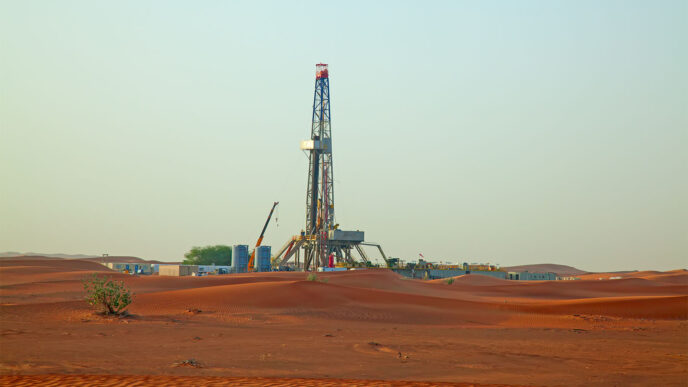
"Saudi Arabia needs oil to sell for $80 a barrel to maintain their current standard of living. The price was $60 before COVID-19, dropped to $0 and is hovering today at around $40. The economies of these countries can’t be sustained at that price. It’s an existential problem that threatens between 90-95 percent of their income."
What’s the second problem?
"Their second problem is climate change. They really live in the hottest place in hell, and in a few decades the hypermodern cities in which trillions have been invested, Abu Dhabi, Kuwait City, Dhahran, Manama, could become a monument to their lost greatness.
"It bothers those who understand that these places are symbols of government. Symbols of luxury of the monarchies. The moment that is certainly coming that these cities become problematic for maintenance, because there will be no money to maintain them when oil diminishes, is a politically problematic moment for these kingdoms.
For 15 years they have been claiming that they want to diversify their economy and reduce their dependence on oil. They have the area with the most sun in the world, 300 days per year, lots of solar radiation, and lots of land because there is no water so there is no real agriculture. And they have money to invest."
"Between these two problems, these countries are afraid of being in the same position as salt tycoons of the 19th century. In the past, salt was in high demand, as a preservative for meat. When the demand for salt declined with the invention of the refrigerator, the political power of the salt barons disappeared. Poland in the sixteenth and seventeenth centuries was ruled by salt barons, and salt dictated tremendous political events. With the decline in the value of the quarries they controlled, their power vanished. This distress is growing in the Gulf states."
How does this relate to the climate crisis? They can just move on to invest the money in high-tech and continue to live off it.
"True, but they have a better entry point into the energy market. They control OPEC, the organization of countries that produce oil. They have a relative advantage in the energy economy.
"For 15 years, they have been claiming that they want to diversify their economy and reduce their dependence on oil. I suggest, first of all, to switch to alternative energies internally. They have the area with the most sun in the world, 300 days a year, lots of solar radiation, and lots of land because there is no water so there is no real agriculture. And they have money to invest.
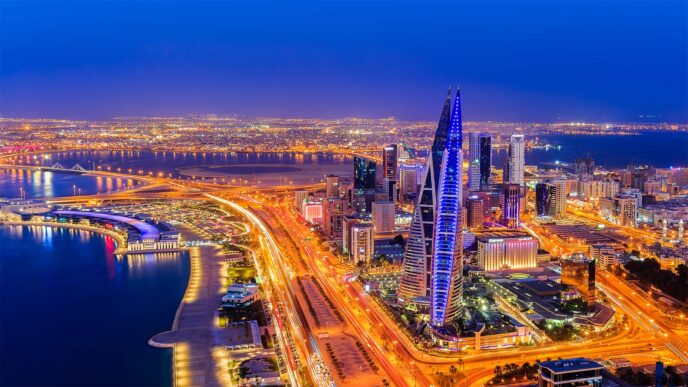
"With renewable energies, the big investment is up front. Unlike coal, oil or gas stations, where your major expenses are paying for supply. In this instance you put down the money up front, and here they have a big advantage.
"Another part of the proposal I bring in the book is that they should invest in solar power generation capacity all over the world. This is the right investment for them. They will go from owning 30 percent of the oil economy, to owning 30 percent of the renewable energy market."
But then they bring the end of the oil age closer, and accelerate the arrival of threat to themselves, no?
"This is where the third component of my proposal comes in. After switching to renewable energy themselves, and after investing in alternative energy production around the world, they can take advantage of their oil positions at a time that suits them and proactively eliminate the market. It could happen within five to seven years. At which point the Arab Gulf states will achieve 30 percent control of the renewable energy market.
"Closing their oil tap will be just the extra straw on the camel's back that will be needed for the world to make the transition. It will flip the cost gap in favor of renewable energies and accelerate the end of the oil age. These countries have the option to ride the tiger, instead of being its prey."
“The change doesn’t always come from where we would like it to”
You come from a place of activism, of looking at issues of inequality, and you present here an orderly plan for conserving the power of authoritarian, undemocratic leaders, in some of the countries with the largest economic inequalities in the world.
"I’m not pretending to bring moral redemption to the world. I’m presenting the reality as it is. The danger of the climate crisis, of climatic chaos, is so clear, tangible and modern, that we cannot apply purity tests. The Gulf states are not our last and only hope. But they are the place where you can accelerate a process that is currently happening too slowly.
"But yes, the assumption I’ve incorporated in this matter is an assumption of greed. Of thirst for power. 200 men rule these kingdoms. Each is a monarch, surrounded by several dozen relatives. This unique group has the power, and the interest, to do something that would take dozens of years in any other scenario."
The great hope of the struggle for climate change is the princes of oil?
"I come from the environmental movement. I was the chairman of the Greenpeace organization in the Middle East and the vice chairman of the organization in the UK. I was the chairman of Life & Environment, the umbrella organization of environmental organizations in Israel. Today I am the chairman of the Association of Environmental Justice in Israel.
"I've been a part of this game for 30 years. The solution that the environmental movement offers is close to my heart and I did not part with it ideologically. This solution makes clear sense. We will understand the science of climate change; we will formulate action plans to reduce emissions; We will create political force to put pressure on politicians, who are reasonable people who want to stay in power and need public support. There is also the matter of changing consumption habits, but the main goal is to make it clear to politicians that if they do not do the right things environmentally, they will lose power.
"This is the path that the environmental movement in liberal democracies has been following for 30 years. It is reasonable, it is the logical, right and socially correct path – but it has failed. It is simply too slow and there are artificial obstacles at every step.
“In lectures on the book, I end with a slide that on the one hand sees Muhammad bin Salman, MBS, Saudi Crown Prince, and on the other hand Greta Thunberg, the climate activist.
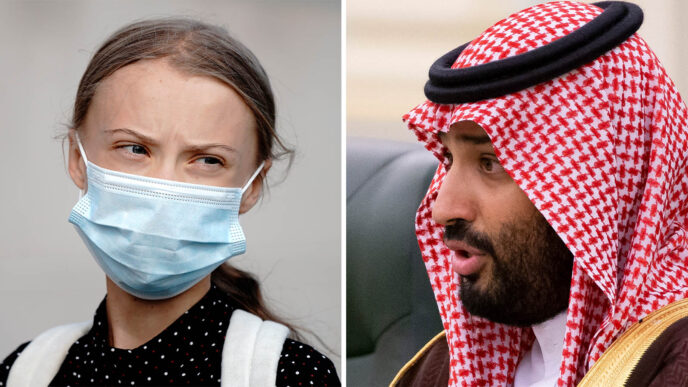
"This is the choice we have. To remain on the side of the righteous with saviors like Greta and Al Gore, and to watch in ten years, as millions, or billions of lives are ruined by climate change, or to realize that the change doesn’t always come from where we would like it to."
That’s a difficult moral dilemma.
"This is the kind of dilemma that history is full of. In the 1980s and 1990s we talked about feminists who were part of national liberation movements. We were being liberated from the yoke of colonialism, or from the yoke of class oppression, but we then duplicated the rule of patriarchy within the revolution. So what should be done first?
"If in the next 10 or 15 years we do not bring about a dramatic decline in the carbon dioxide emissions curve, then all the other questions, which are part of my conceptual DNA, will no longer exist. In Syria and Sudan, for example, this has already happened. The extended drought in Syria was one of the triggers for the civil war that dismantled the country there and brought tremendous suffering. The vulnerable countries in the region will have a hard time feeding their citizens if things do not change.
"By the way, this is also an Israeli angle. From a climate point of view, Israel will be able to cope. Temperatures in Israel are not expected to rise by more than three degrees, and we have national resilience, technological capabilities and systems that can handle crises. The main issue is climate refugees from neighboring countries, and refugees, whether displaced due to war or a climate crisis, are a public that has nothing to lose and can create instability. This may actually endanger Israel.
"So the house is on fire. This fire is chasing the train we all live on. We can’t do purity tests in times of danger. First of all let’s get everyone together to put out the fire, then we can figure out if among those who helped put it out there were bad people."






